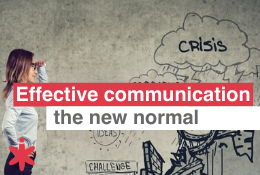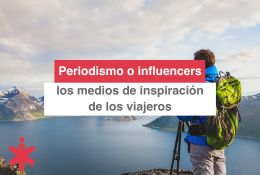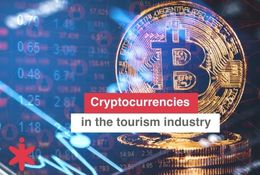Effective Communication: From the Crisis to the New Normal
Effective Communication: From the Crisis to the New Normal

When we can travel again, who will sell us the trips?
22/05/2020
Study about the Impact of COVID-19 on Global Tourism Distribution.
17/06/2020Effective Communication: From the Crisis to the New Normal

The COVID-19 pandemic is, by its very nature, a global crisis that has affected all sectors and businesses, including tourism.
From its origin, throughout its development and particularly as we move towards recovery, we must use the fundamentals of crisis communication management to protect the image and reputation of businesses and destinations and, furthermore, emerge stronger and prepared to face rebounds of this pandemic, or perhaps to deal with other crises that we cannot yet foresee.
A crisis is a sudden and unexpected phenomenon that alters everything and compels us to rethink messages and strategies. Companies and institutions try to avoid them: sometimes they manage, and sometimes it is not possible, and they have to navigate through them.
The canons of crisis communication maintain that, in order to be effective, it should be able to prevent crisis. But how can a pandemic be avoided? Beyond the disquisitions about public management or the scientific aspects linked to the COVID-19 phenomenon, the reality is that companies and institutions must face an unprecedented event, a crisis with few references on which to rely on to adopt practices or actions.
The reality is that all crises have many things in common. The very evolution of the pandemic and its sociological and economic impact have demonstrated the power of effective communication, even more in a connected world that has had to isolate itself, but in which we have desperately sought connection.
What, how and when should we communicate? This is a crisis that affects everyone, in all sectors, because it affects health and well-being. It is important to be able to read the signs, to understand the elements that build and will shape the collective mood, whose pillars are transparency, commitment and collaboration.
We can share some recommendations for effective communication in this current crisis situation:
- Not to disappear, but to rethink the ways to connect with stakeholders: This has been successfully done by many companies and entities around the world. They have built alternative bridges with their clients through emotional messages linked to their core values. These contents must be reconfigured, putting the focus on the productive activity that is resumed and on the role that is assumed during recovery and for the future. It is also important to remember that stakeholders are not only outside our organization; strategic lines of communication must also be developed with employees, partners and collaborators, who have been exposed to the crisis in various ways and are an important part of the brand identity, quality and service delivery in our companies or destinations.
- Positive but realistic messages: the difficulties and problems associated with the pandemic are at the core of the debate and at the root of profound changes, but it is also important to highlight progress and achievements. Likewise, we must avoid pessimism without losing touch with reality, with the difficulties and barriers that society will encounter in order to start again to consume our products and services.
- Not everything is coronavirus: it is important that brands find moments of parenthesis to inspire beyond the pandemic, to escape from over-information and to focus on other aspects of life, especially in this process of transition to normality that is to come. It is very important, especially for products or services that are not part of people’s basic needs (such as tourism), to find those spaces of emotional connection and pause, which will once again place them, in a privileged way, on the list of consumers’ priorities.
- Contribution and purpose, key in post-crisis messages: individuals, companies and entities have learned that our actions contribute to improving or worsening the crisis, and that we all have a role in building the future. Messages must be aligned with this sense of purpose and contribution, because a large part of business, public and private decisions will depend on the meaning that professionals and consumers give to each of their choices. In this sense, the concept of sustainability moves from abstraction to the practical level, from big words to the reality of actions: how does my consumption impact on my community, how do my choices help or harm others?
- Reduce uncertainty with clear and relevant information. Efforts should be made to explain, in a clear, didactic and concise way, all safety and hygiene measures that companies and destinations are taking to resume their activities with guarantees for consumers. Fear and uncertainty can be only reduced with certainties, with data and with simple explanations that guide consumers on how the experience will be. To do this, we must anticipate the barriers the consumer will encounter, compensating these less-friendly messages with others that focus on the positive experience they will enjoy, something that is fundamental for tourism companies and destinations.
- The value of innovation as a tool for improvement. Companies, from all sectors, need to innovate in order to survive, and it is important to highlight and praise for the ability to adopt new forms of management, new technological tools and new strategies to overcome the crisis; and to share resources with other similar companies and from other sectors.
- Clear and transparent messages. As per the tone, transparency (both in positive and negative scenarios), as well as simplicity and clarity (particularly to land complex concepts, new protocols or rules) are particularly relevant to convey or messages. We should also consider adding other elements to our discourse such as the attitude of collaboration and exchange (a natural reaction that is worth pursuing to improve relations with stakeholders, competition and other areas of activity) and empathy (being able to design actions and strategies that really take into account the priorities and concerns of our stakeholders).
We are witnessing profound social changes as a result of the COVID-19 pandemic, and more are yet to come: some will stick and others will disappear and, to that extent, strategies and messages will have to be modified and adapted, either from a positive approach or from a less promising view, if we revert to a more adverse epidemiological situation.
Precisely because we are in a developing crisis, which will be sustained in time, it will require temperance, balance and transparency from companies and institutions. The goal is for travellers to lose their fear, to dream of travelling again, feeling safe from the moment they are planning and choosing their destination, until they return home.
Ana María Márquez
PR Director


 All the news
All the news  Back to newsroom
Back to newsroom

